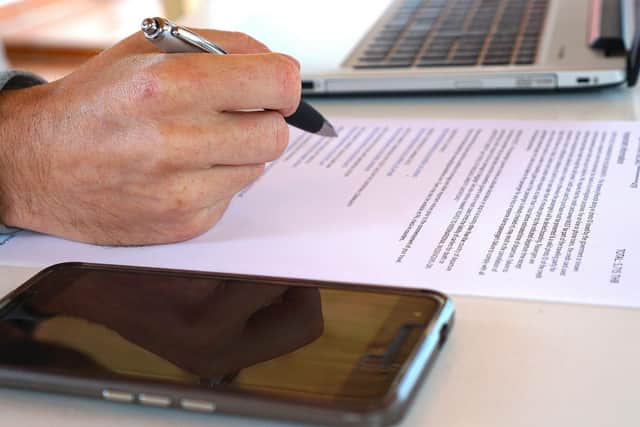Alex Kane: Huge change is coming ... and is nothing to be afraid of


A few days ago I was particularly struck by a response from someone when asked how she and others in her profession were coping with the crisis: “I am amazed by how my colleagues are just getting on and meeting the challenges. We’ve been able to make a lot of changes that will be very positive and I think will become embedded in practice after this is all an awful memory. It’s incredible how the red tape has disappeared and has been replaced by a ‘can do’ attitude throughout the various levels of the service.”
What struck me most about her response was that it was very similar to what I’ve heard from others over the past few weeks. Indeed, I’ve been both surprised and heartened by the ‘can do’ attitude of so many of those who’ve found themselves on the frontline for weeks on end. For years we’ve taken these people for granted; always expecting them to be there when we need them and then being surprised when we realise how much they’ve always been doing for us on a daily basis.
Advertisement
Hide AdAdvertisement
Hide AdIt is worth bearing in mind – because it says a great deal about pre-crisis attitudes – that just a few months ago criticism of the NHS, of waiting lists, of missed appointments, of infections acquired during hospital stays (MRSA and C.Diff, to name just two), of suddenly cancelled operations, of crowded A and Es and of consultants not being available for months on end, was rife.


Now, millions of people are clapping their support every Thursday evening. It took a crisis of this magnitude to make people realise the value of the NHS; and it took a crisis of this magnitude for politicians (many of whom have been niggardly in their approach to funding it) to realise how brilliantly, speedily and bravely the NHS was able to rise to this challenge.
In a column for the News Letter a couple of weeks ago I expressed a fear that a key lesson from the crisis – the need for specific changes and increased funding for the NHS – would be forgotten once people believed life had returned to normal. Let’s be honest, there’s not much point in clapping today if we cop out of the economic consequences tomorrow; is there? Sadly, I still think that’s what’s likely to happen.
I think it’s also likely that increasing numbers will remain working from home full-time. A lot of businesses have realised that it’s not necessary to have people driving, bussing, cycling or getting a train to work, just to sit in an office for hours on end. A computer or laptop works just as well at home. Meetings are easily arranged through Skype and Zoom. Staff can work in a way that suits them best. Flexi work becomes easier, not least because offices don’t need to be kept open from 8am to 6pm. Computer technology has already created paperless offices and it was almost inevitable that peopleless offices wouldn’t be far behind.
Advertisement
Hide AdAdvertisement
Hide AdWhat we’ve seen across the world since January has been the test-driving of a new way of running businesses and running our personal lives. Again, it has been heartening to see how well we’ve all adapted; how so many of us have realised that it is possible to do things differently and maybe even do them better. I was listening to an interview with someone who has spent almost four hours every day commuting to an office in the centre of London to sit at a computer at a desk because, “well, that’s just the way it has been done for years. When this ends a lot of us, with the firm’s blessing, will continue to work from home”.
There is an advertisement on the back of last week’s The Economist: ‘Tradition is history. Disruption is the law of tomorrow. The rules of business and society have changed. 85% of jobs that will exist in 2030 haven’t been invented yet. How will you embrace the opportunities? Discover what you can do with the law of tomorrow, today...’. I’m old enough to have already seen a huge change in working and types of work in my lifetime and I’m now going to see another huge change.
People shouldn’t be scared. Societal upheaval is normal following a great crisis or change (look at the changes which followed the end of the war in 1945, for instance; or the consequences of the ‘new’ technological revolution we’re still living through). This health crisis has already made us reassess a number of the fundamentals of our everyday lives and how we live them. So yes, there will be consequences and changes: in how we live our lives and in how we work. Our welfare state – with the NHS at its heart – is probably the single most important consequence to follow the VE Day celebrations in 1945. As a nation, we knew that we wanted change.
Certain types of crises can be predicted and war-gamed. It’s absolutely certain, for example, that there will be new economic collapses, political upheavals and pandemics (probably worse than the present one); each of which will result in sweeping changes and new ways of doing things. There may even be a world war (albeit fought differently than previous wars). All of these eventualities can be thought about, computer-modelled and tested. What we cannot test is the psychological impact on the millions of individuals who will bear the brunt of the impact.
Advertisement
Hide AdAdvertisement
Hide AdBut even the experts didn’t predict that the two minutes silence on VE Day would happen under lockdown conditions. No one had war-gamed that possibility. Anything and everything can change: and change without warning. For young people that’s the most important lesson to take from this crisis.